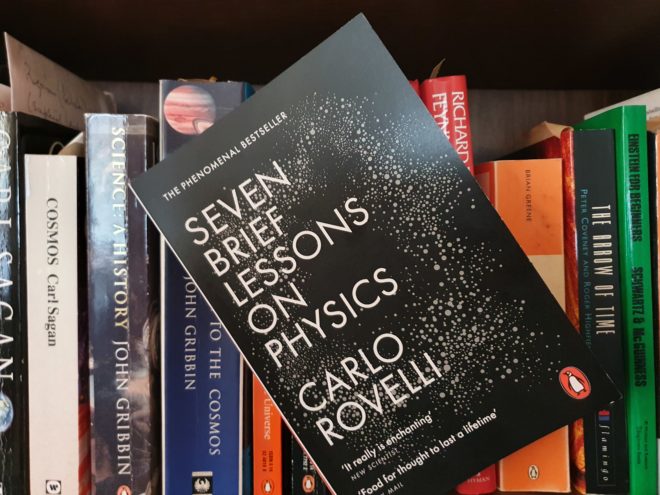Title: Seven Brief Lessons on Physics
Author: Carlo Rovelli
Published: 2014
As the name suggests, this book is brief, very brief in fact – the seven lessons are about 10 pages each. But there is great deal of wisdom packed in this brevity. The book starts with Einstein, outlining the simplicity and beauty of the general theory of relativity, the notion that space-time is curved, and the author’s own experience in coming to understand this revelation. It’s elegantly put, but is not going to give you an in depth understanding of the theory.
From here the book progresses through topics like Quanta, Particles, Time and Black-holes. Although not a central focus the author returns a couple of times to the theme of doubt, and shows the uncertainty that true scientific revolutionaries had over their own theories, Einstein and Bohr, and before them men like Darwin. And we are talking about actual doubt, not just doubting other people whom you disagree with, that’s easy, but doubting your own ideas. It is worth remembering in our technocratic age where a lot of the public debate over science seems more focused on certainty than doubt.
As the brief lessons progress, we get a literate meditation on the nature of physics, science, reality and humanity. Rovelli is more than just a scientist who can also quote Hamlet, though he certainly does that. But this work achieves something more as it zooms effortlessly from sub-atomic particles, to the farthest reaches of the cosmos, then back into the human mind. Over a couple of chapters there is a series of of graphs which show the changing nature of our conception of the the universe and our place it it, from land and sky, to an earth surrounded on all sides by sky, to an earth-centric cosmos, to the heliocentric solar system and then beyond this, speculating of course that there is so much more that we do not yet know.
The sixth and seventh chapters achieve a great and lyrical beauty as the author discusses some of the outstanding mysteries that still don’t make sense in attempts to create a synthesis between quantum mechanics, general relativity and thermodynamics, such as the nature of time. But he points out how limited our own perspective is, like an old man who has never left his village, just because we experience the passing of time does not mean it is a fundamental truth of the universe. We are ultimately a part of the universe and perhaps a temporarily limited part that just happens to experience time this way.
I cannot do justice to the beauty of the final lesson which considers the human mind, the nature of reality, our place in the universe and what our quest to understand this place means.
